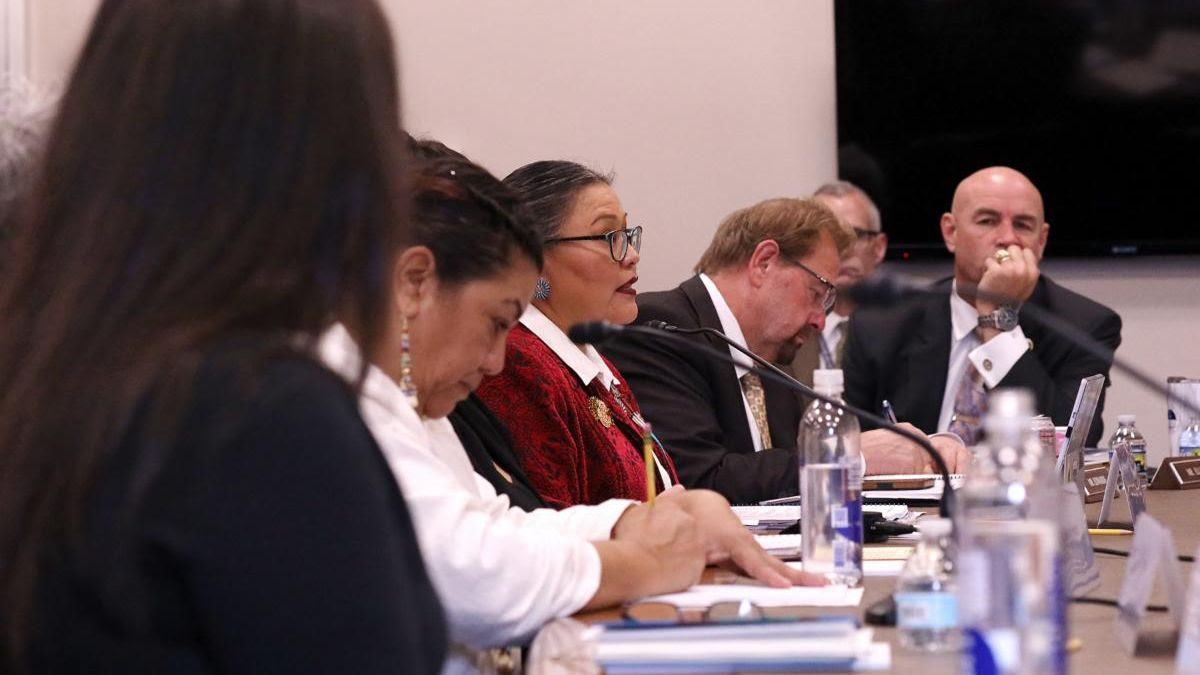
- Details
- By Native News Online Staff
Last week, during a pivotal hearing before the U.S. House Interior and Environment Appropriations Subcommittee, Law and Order Committee Chair Eugenia Charles-Newton delivered a compelling testimony emphasizing the urgent need for federal action to address the crisis of Missing and Murdered Indigenous People (MMIP).
“We must stop pretending these cases are isolated, and we must stop allowing them to be swept under the rug,” Charles-Newton declared, highlighting systemic failures that leave countless cases unresolved.
She underscored the challenges posed by jurisdictional complexities, communication breakdowns, and the severe lack of resources for law enforcement—factors that collectively impede justice for affected communities.
Charles-Newton drew attention to the 75 Navajo Nation members currently missing, many of whose cases remain unsolved due to jurisdictional confusion and poor coordination between federal, state, and tribal authorities. She shared the story of Zachariah Shorty, a Navajo man who disappeared in 2020. Despite being reported to local authorities in Farmington, New Mexico, jurisdictional disputes delayed action from Navajo Nation law enforcement. By the time they were able to investigate, Zachariah was found dead, and his killer remains at large.
“This is just one example of how jurisdictional confusion and lack of resources leave families without answers,” Charles-Newton said. “This must stop. We are doing everything we can with the limited resources we have, but we need Congress to act. The Navajo Nation alone spans over 27,000 square miles with a population of more than 250,000, and it is the largest Native American tribe in the U.S. We have the right to expect better protection from the federal government.”
Her testimony was supported by alarming statistics shared by other lawmakers. Congressman Mike Simpson noted that over two in five Native women experience rape in their lifetimes, Native Americans account for 46% of all trafficking victims in the U.S., and 19 Native Americans are reported missing for every 1,000 individuals—a staggering rate that demands urgent intervention.
While the 2013 reauthorization of the Violence Against Women Act (VAWA) marked progress, Charles-Newton and other advocates emphasized that significant obstacles remain. Many cases are either declined or go unprosecuted, leaving perpetrators unaccountable.
Advocates such as Abigail Echo Hawk and Cheryl Horne called for increased resources and improved coordination between law enforcement agencies, especially in rural and urban areas where Indigenous communities are often overlooked. "It's not just about jurisdiction; it's about accountability," said Echo Hawk. "Resources intended for our communities are not being distributed as they should, and we are left to pick up the pieces."
Charles-Newton concluded her testimony with a direct appeal to Congress, “Education and understanding are the first steps, but we must act. These cases can no longer be forgotten.”
She urged the federal government to take immediate responsibility, address the crisis, and ensure justice for Indigenous victims.
Chairman Tom Cole (R-OK), a tribal citizen of the Chickasaw Nation, wrapped up the hearing by emphasizing the need for bipartisan cooperation. “This is not a partisan issue; it’s a national issue,” Cole said. “The partnership of federal, state, and tribal leadership is essential if we are to make real progress in ending violence against Indigenous women and girls.”
More Stories Like This
Native News Weekly (August 25, 2024): D.C. BriefsUS Presidents in Their Own Words Concerning American Indians
Indigenous Actor Elaine Miles Reports Detention by Alleged ICE Agents
Happy Thanksgiving from Native News Online
Coming Up on Native Bidaské: Behind the Animation: Joey Clift Talks “Pow” and Native Storytelling
Help us tell the stories that could save Native languages and food traditions
At a critical moment for Indian Country, Native News Online is embarking on our most ambitious reporting project yet: "Cultivating Culture," a three-year investigation into two forces shaping Native community survival—food sovereignty and language revitalization.
The devastating impact of COVID-19 accelerated the loss of Native elders and with them, irreplaceable cultural knowledge. Yet across tribal communities, innovative leaders are fighting back, reclaiming traditional food systems and breathing new life into Native languages. These aren't just cultural preservation efforts—they're powerful pathways to community health, healing, and resilience.
Our dedicated reporting team will spend three years documenting these stories through on-the-ground reporting in 18 tribal communities, producing over 200 in-depth stories, 18 podcast episodes, and multimedia content that amplifies Indigenous voices. We'll show policymakers, funders, and allies how cultural restoration directly impacts physical and mental wellness while celebrating successful models of sovereignty and self-determination.
This isn't corporate media parachuting into Indian Country for a quick story. This is sustained, relationship-based journalism by Native reporters who understand these communities. It's "Warrior Journalism"—fearless reporting that serves the 5.5 million readers who depend on us for news that mainstream media often ignores.
We need your help right now. While we've secured partial funding, we're still $450,000 short of our three-year budget. Our immediate goal is $25,000 this month to keep this critical work moving forward—funding reporter salaries, travel to remote communities, photography, and the deep reporting these stories deserve.
Every dollar directly supports Indigenous journalists telling Indigenous stories. Whether it's $5 or $50, your contribution ensures these vital narratives of resilience, innovation, and hope don't disappear into silence.
 The stakes couldn't be higher. Native languages are being lost at an alarming rate. Food insecurity plagues many tribal communities. But solutions are emerging, and these stories need to be told.
The stakes couldn't be higher. Native languages are being lost at an alarming rate. Food insecurity plagues many tribal communities. But solutions are emerging, and these stories need to be told.
Support independent Native journalism. Fund the stories that matter.
Levi Rickert (Potawatomi), Editor & Publisher

